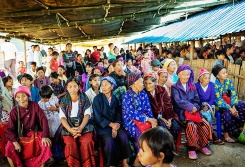By Sushetha Gopallawa* | IDN-InDepth NewsReport
WASHINGTON DC (IDN) – While in Myanmar’s Kachin State in May, I visited a number of displacement camps around and I also met with Kachin community-based organizations (CBOs) who deliver aid in both government and non-government controlled areas.
Over 100,000 people have been displaced since conflict between the Myanmar military and the Kachin Independence Army (KIA) resumed in June 2011. While about 35,000 of these individuals are living in government-controlled areas, more than half of the displaced are located behind rebel lines, in areas controlled by the Kachin Independence Organisation (KIO), the KIA’s political wing.
The KIO have granted humanitarian agencies permission to enter their territory and deliver assistance. The Myanmar government, however, continues to block the UN and the international donors from accessing KIO-controlled areas. Thus the majority of internally displaced persons (IDPs) in Kachin State are largely dependent on local CBOs for their most basic needs – including shelter, food, health care, water and sanitation, access to medicines, education, and protection.
For even the best equipped agencies, accessing IDP camps in KIO-controlled areas can prove difficult. Many camps are located in remote areas at high altitudes, and during the rainy season (which lasts from May to October), the roads become almost impassable. Supplies often need to be transported by mule, making the process slow and complicated, and hampering the ability of CBOs to do their lifesaving work.
Geographically speaking, some parts of KIO territory are more easily accessed through China than through Myanmar. However, donor restrictions and Chinese border rules make aid delivery very challenging. China does not allow supplies bearing logos of foreign organizations to be transported across its borders, and it also restricts the shipment of food and medicines procured inside Myanmar through China to KIO-held areas. Most donor agencies, meanwhile, prohibit CBOs from purchasing supplies in China.
These complex logistical issues force most CBOs in Kachin State to take incredible risks. During my time in the region, I heard many stories about the innovative – and often dangerous – steps that CBO staff take to reach those in need. Some hide in the forests and wait until nightfall, or until the Chinese border guards have left their posts, before crossing into KIO-controlled areas via China. They also collaborate with Kachin drivers living inside China to find back roads and avoid official border crossings. Still other CBO staff work with Chinese-based Kachin businessmen and traders to procure much needed supplies, and then store them until they are ready for transportation to the IDPs.
Some of these CBO workers have been stopped and questioned by the Chinese border authorities. But if not for their work in rebel-held areas – at such grave personal risk – thousands of IDPs would receive barely any lifesaving assistance.
Instead of directing aid through these courageous CBOs, some major donors and agencies – most notably the U.S. government – have decided to wait until the Myanmar government allows UN convoys to go behind rebel lines. These donors also maintain that many CBOs have limited capacities, lack accountability and are insufficiently transparent. But it could be weeks or months before official access to KIO zones is granted, so it is time for the donor community to think outside the box and be flexible in supporting these CBOs in the KIO-controlled areas. Indeed, they should also invest in capacity-building for these groups to help them meet international standards, rather than simply dismissing them.
Without the incredible work being done by community organisations in KIO-controlled areas, the UN and the international community would have another humanitarian crisis on their hands in Kachin. But to keep the situation from getting worse, they will have to recognize these groups as real partners. opensocietyfoundations.org
*The writer, a former Sri Lanka foreign service officer, visited Myanmar’s Kachin State for Refugees International. Her report is reproduced with permission. [IDN-InDepthNews – June 04, 2013]
2013 IDN-InDepthNews | Analysis That Matters
Image credit: open society foundation
Send your comment | Subscribe to IDN newsletter
Follow us on Twitter and Facebook:
http://twitter.com/InDepthNews
http://www.facebook.com/IDN.GoingDeepe

